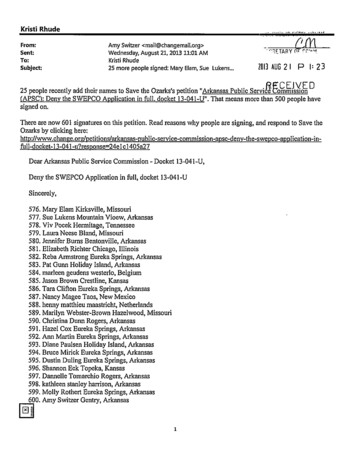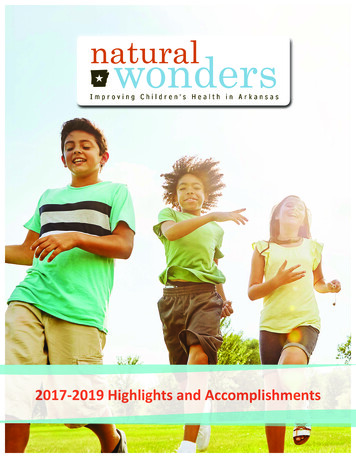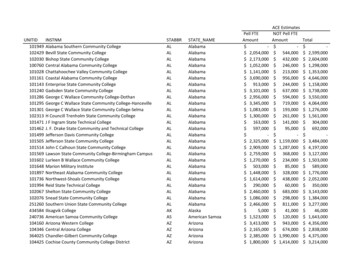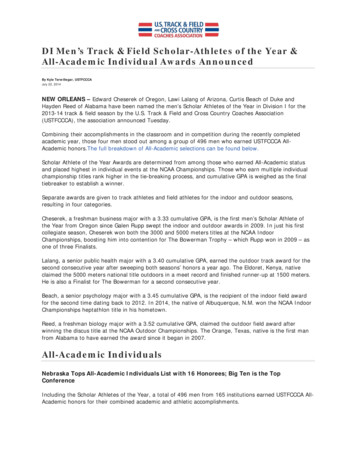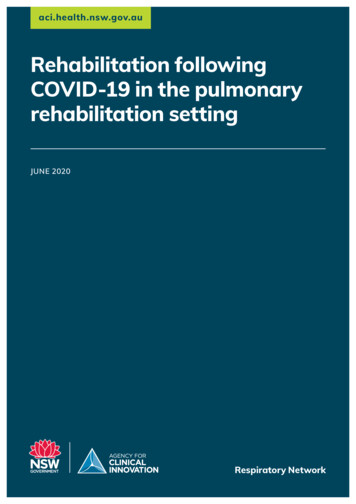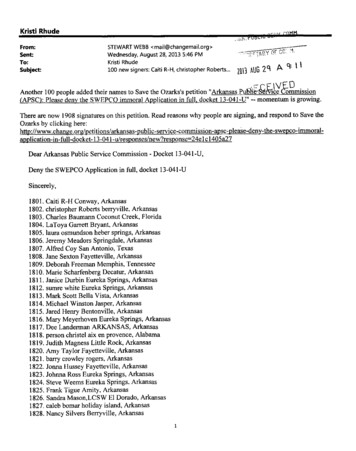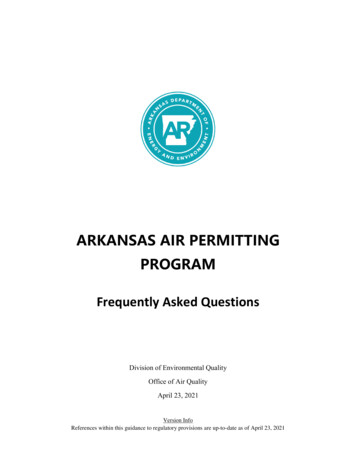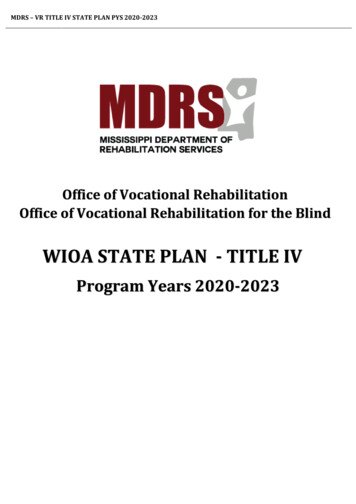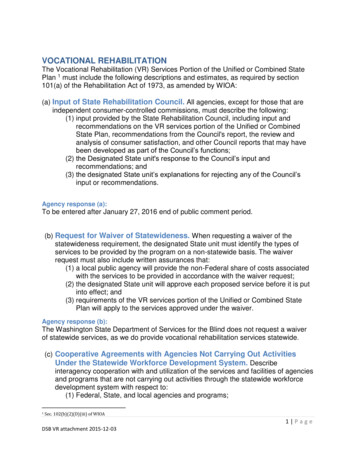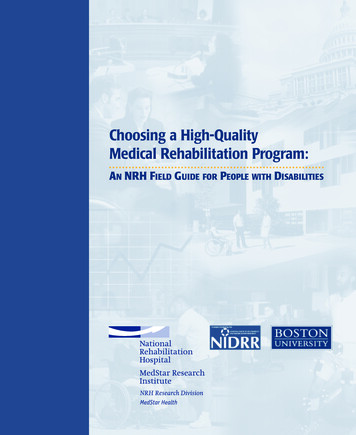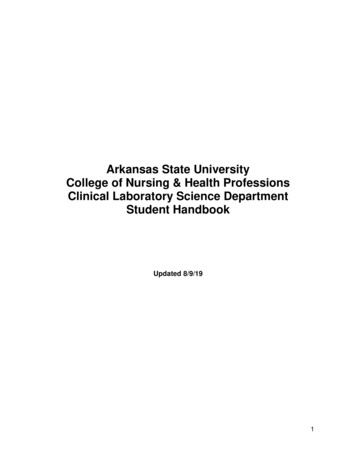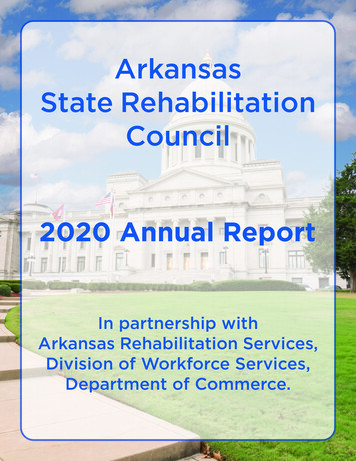
Transcription
ArkansasState RehabilitationCouncil2020 Annual ReportIn partnership withArkansas Rehabilitation Services,Division of Workforce Services,Department of Commerce.
Table of ContentsA Message from the State Rehabilitation Council Chair. 2Greetings from Commissioner Baxter. 3ARS Field Services District Map.4State Rehabilitation Council Membership.5Goals. 6-7Responsibilities of the Arkansas State Rehabilitation Council. 8-10Arkansas Rehabilitation 26 Closures Fast Facts. 11-15VR Affiliated Programs. 16-25 Arkansas Career Development Center (ACDC). 16-18 Business Engagement.19 Project SEARCH .20 Access and Accommodations.21-22 Transition Services.23-252020 Stories of Success.25-28
A Message from the Chair2
Greetings from CommissionerMichael PrestonSECRETARY OF COMMERCECharisse Childers, Ph.D.DIRECTOR,DIVISION OF WORKFORCE SERVICESJoseph BaxterCommissionerArkansas Rehabilitation ServicesDecember 2, 2020Greetings,Along with Chairman David Maples, it is my pleasure to provide the 2020 Annual Report of the State ofArkansas Rehabilitation Council. The input of the State Rehabilitation Council is much more than a federalrequirement; it is essential for the assurance that the work of ARS remains strategically focused on successfulvocational outcomes for individuals served by this agency. This input allows us to consider all stakeholders'perspectives when prioritizing the most effective and efficient use of available resources. Despite thechallenges we have faced for most of 2020, I am very proud that ARS has still pushed forward with theinvaluable work it does. Some of the highlights of this past year include: Successfully completing and submitting the VR portion of the WIOA State Plan, including goals andpriorities developed in partnership with the SRC. Celebrating the 100th anniversary of the public VR program, the 75th anniversary of National DisabilityEmployment Awareness Month, and the 30th anniversary of the ADA. In a year that doesn't allow largegatherings, we were able to celebrate these historical milestones with a digital media campaign thathelped spotlight the amazing work and success stories we have had since the Arkansas Legislature enacteda Vocational Rehabilitation Service in 1923. Our coordinated agency response in the provision of VR services during the COVID-19 pandemic. CentralOffice and all 18 field offices remained open and following CDC guidelines. By discovering and embracingnew technology, we were able to keep providing clients with services while maintaining both the client andthe employee's safety. The continued and successful conversion of the Arkansas Career Development Center (ACDC) to anonresidential facility. Though COVID-19 provided many obstacles to this conversion, the ACDC staff hasfound many successful ways to work around the pandemic to train students for successful careers.These are just a few of the outstanding successes that ARS continues to strive for every day.I look forward to the coming new year, and the possibilities we have to help even more Arkansans withdisabilities thrive and succeed.Sincerely,Joseph Baxter, CommissionerArkansas Rehabilitation ServicesArkansas Department of CommerceDivision of Workforce Services - Arkansas Rehabilitation Services1 Commerce Way, Suite 206 Little Rock, AR 72202ARC areerEd.orgEqual opportunity employer/ program. Auxiliary aids and services are available upon request to individuals with disabilities.3
ARS Field ServicesCarrollBentonBoone* HarrisonWashingtonMadisonNewton* FayettevilleCrawfordFranklin* Ft.SmithSebastianJohnson* BoonevilleMontgomeryPolkVan tteColumbiaSalinePulaski LonokeDallasClevelandAshleyUnionChicotRegion 6Kimberley Baker, Rehabilitation Area ManagerHot 9501-317-1390Region 7Region 2Robin Hunt, Rehabilitation Area Manager870-972-0025870-793-4153501-268-4542Little Rock:501-686-2800North Little Rock: 501-833-1490Region 8Region 3Kensel Green, Rehabilitation Area ManagerEverett Adamson, Rehabilitation Area ManagerTexarkana:El Dorado:West Memphis: -5451Region 9Region 4Sterling Hughes, Rehabilitation Area ManagerDana Byrum, Rehabilitation Area ManagerPine Bluff:Monticello:479-755-3300479-675-3835Region 5870-534-2404870-367-9669Field Services LeadershipAndrea Gilliam, Rehabilitation Area ManagerRussellville:Conway:DeshaDrewKimberly Clayborn, Rehabilitation Area ManagerFort Smith:Booneville:PhillipsBradleyAmy Jones, Rehabilitation Area W.Helena*MonticelloCalhoun*El DoradoArkansas* Pine BluffJeffersonWestMemphis*LeeMonroe* LittleRockCrittendenSt. FrancisPrairie* NorthLittle Rock* BentonCrossWoodruffFaulknerMississippiPoinsett* SearcyRegion 1Fayetteville:Harrison:* rkanaGreeneLawrenceIndependenceCleburneHot Spring GrantClarkLittle River HempsteadConwayPerry* Hot SpringsSharp* Batesville* PopeFultonBaxterMarionCarl Daughtery, Chief of Field ServicesDr. Deandriea Bass-Carrigan, Deputy Chief of FieldServicesGaye Jones-Washington, Deputy of Field OperationsKristen Sutterfield, Rehabilitation Program Manager479-890-5751501-730-9725Field Offices: Counties ServedBatesville: Independence, Cleburne, Van Buren, Stone, Izard,Jackson, Sharp, White, FultonBenton: SalineBooneville Logan, Franklin, Polk, ScottConway: Conway, Faulkner, PerryEl Dorado: Ouachita, Calhoun, Dallas, Union, ColumbiaFayetteville: Benton, Washington, MadisonFort Smith: Crawford, SebastianHarrison: Baxter, Boone, Marion, Newton, Searcy, CarrollHelena: Lee, Phillips, MonroeHot Springs: Clark, Hot Spring, Montgomery, Garland, PikeJonesboro: Woodruff, Clay, Craighead, Greene, Lawrence, Poinsett, RandolphLittle Rock: Pulaski [south]Monticello: Ashley, Desha, Bradley, Lincoln, Chicot, DrewNorth Little Rock: Pulaski [north], Lonoke, PrairiePine Bluff: Jefferson, Cleveland, Grant, ArkansasRussellville: Johnson, Yell, PopeSearcy: White, WoodruffTexarkana: Howard, Lafayette, Nevada, Hempstead, Miller, Sevier, Little RiverWest Memphis: St. Francis, Crittenden, Cross, Mississippi10204
State Rehabilitation Council MembershipDavid MaplesChairBauxiteKelly SharpFarmingtonWesley EddingtonJonesboroJohn TaylorCo-ChairViloniaChristopher PaslayBrooklandAddie EdwardsCamdenFrances JohnsonBryantKesha PilotLittle RockKeith VireFayettevilleTom MasseauMaumelleMatt SowellViloniaKimberly ClaybornJonesboroJoseph BaxterARS Commissioner(Ex-Officio)Robert FaganLittle RockCraig ReinhardtLittle RockThe Arkansas State Rehabilitation Council (SRC) is a citizens’ advisory council, appointed bythe Governor, to provide guidance to the state’s Vocational Rehabilitation (VR) Program. Itsmembers help shape policy, engage in strategic planning, and provide guidance to promoteincreased employment for individuals with disabilities. Members report annually to theGovernor and the U.S. Department of Education on the status of the VR program. The SRCspearheads customer satisfaction surveys, participates in the preparation and review of thecomprehensive needs assessment, and co-hosts public hearings and forums. The councilincludes individuals with disabilities, community rehabilitation program employees, vocationalrehabilitation counselors, advocates, and representatives of the business community.5
Goals and PrioritiesAs required by the Workforce Innovation and Opportunities Act (WIOA), ArkansasRehabilitation Services (ARS) submitted its portion of the Arkansas combined StatePlan in FY2020. Within that State Plan are specific goals and priorities for ARS thatwere developed in partnership with the State Rehabilitation Council to address bothWIOA requirements and ARS’s ability to better serve its customers.Our goals and priorities are as follows:Goal 1: ARS will meet performance accountability measures as outlined inWIOA.Priorities: ARS will monitor established performance accountability measures. ARS will provide career counseling to 14(c) program participants to meet Section511 requirements. ARS will strengthen data verification requirements.Goal 2: ARS provide pre-employment transition and transition services asoutlined in WIOA.Priorities: ARS will expand and improve Pre-ETS. ARS will provide Pre-ETS and ensure students with employment and training goalsare moved into Vocational Rehabilitation prior to the second semester of the senioryear of high school. ARS will expand and improve Pre-ETS utilizing the resources of the ArkansasCareer Development Center (ACDC). The new model focuses resources to servestudents with disabilities to prepare and guide them toward achieving competitiveintegrated employment. ARS will increase the number of Transition students that enter employment byhaving students work-ready upon graduation from high school or postsecondarytraining.Goal 3: ARS will create effective partnerships to advance employment forArkansans with disabilities.6
Goals and PrioritiesPriorities: ARS will focus on public and private sector employers and increase business andindustry awareness of ARS’s services. ARS will develop and strengthen partnerships with business, workforcedevelopment partners, economic development agencies, and communityorganizations to meet the needs of existing and new business customers. ARS will increase services provided to public and private sector employers byleveraging Stay-at-Work/Return-to-Work (SAW/RTW) programs to assist employersin keeping the employees with disabilities on the job.Goal 4: ARS will increase effectiveness and efficiency of service delivery.Priorities: ARS will determine effective methods to serve the underserved/unservedpopulations. ARS will strengthen relationships with WIOA partners and business and industry. ARS will improve service delivery to job seekers and businesses by consistentlyproviding services that meet individual needs. Staff will receive comprehensive training to improve service delivery. ARS will ensure clients have access to assistive technology services by evaluatingthe need for assistive technology throughout the rehabilitation process, and bymaking the proper referrals when assistive technology is appropriate.Goal 5: ARS will increase the utilization of Community Rehabilitation andSupported Employment providers to achieve employment outcomes.Priorities: ARS will increase the effectiveness of current and new external Employment/Supported Employment providers. ARS will expand the availability of community employment providers and partnerservices that meet the needs of Arkansans with disabilities, including those requiringsupported employment. ARS transformed the Arkansas Career Training Institute (ACTI) to a new servicedelivery model, ACDC. This model focuses as a hub for training and services tosupport vocational rehabilitation consumers and/or students with disabilities tosuccessfully reach the milestones of their individual plans for employment.7
Responsibilities of the Arkansas StateRehabilitation Council Reviews, analyzes, and advises Arkansas Rehabilitation Services regarding the performance ofits responsibilities under Title I of the Rehabilitation Act as it relates to program eligibility (includingorder of selection) and the extent, scope, and effectiveness of services provided; In partnership with the Arkansas Rehabilitation Services helps develop the Arkansas State Planfor the Vocational Rehabilitation Services Program; Submits an annual report to the Rehabilitation Services Administration (RSA) commissioner andGovernor that highlights vocational rehabilitation services goals and achievements and make thereport available to the public; Helps coordinate working relationships between Arkansas Rehabilitation Services, the StateIndependent Living Council (SILC) and centers for independent living; Coordinates activities with other councils to avoid duplication of effort and help increase thenumber of individuals served; Performs other functions consistent with the Title I of the Rehabilitation Act as the Arkansas StateRehabilitation Council determines to be appropriate; and To the extent feasible, reviews and analyzes Arkansas Rehabilitation Services’ vocationalrehabilitation program effectiveness including an assessment of consumer satisfaction withrehabilitation services provided. An example of the current form used to gauge consumersatisfaction, and the mean results for FY 2018 follow.Meeting DatesFY 2020 Meeting DatesDecember 19, 2019March 19, 2020June 18, 2020August 19, 2020September 17, 2020Proposed FY 2021 Meeting DatesOctober 8, 2020December 17, 2020March 18, 2021June 17, 2021September 16, 20218
Consumer Satisfaction Survey SampleELPMAS9
FY 2020 Survey 14.65Yes 204.50Yes 374.4110
FY 202026 Closures Fast FactsSuccessful Closures by RegionCarrollBentonBoone* HarrisonWashingtonMadisonNewton* FayettevilleCrawfordFranklin* Ft.SmithSebastianJohnson* Booneville* ay* Hot SpringsSalineNevadaLafayette* Pine leyAshleyUnionChicotRegion 1457Region 4309Region 7383Region 2256Region 5133Region 8350Region 3110Region 6199Region l DoradoLeeMonroe* LittleRockOuachita*TexarkanaMillerPulaski LonokeCrittendenSt. FrancisPrairie* NorthLittle onWhite*ConwayHot Spring GrantDallas* Jonesboro* BatesvilleCleburneGreeneCraighead* Searcy* kLittle River HempsteadStoneClayRandolphSharpIzardVan phis*
FY 202026 Closures Fast FactsAge Range of Successful 0030129660 12820000Race and EthnicityAlaskan Native/American Indian:14Asian:15Black/African American: 764Hispanic: 92Multiracial: 9Native Hawaiian Pacific Islander: 4White/Caucasion: 1,588050010001500122000
FY 202026 Closures Fast FactsPrimary e600498446500400Communicative436Deafness/Hard of 10060Successful Closures by GenderMale1,126Female1,32013
FY 202026 Closures Fast FactsStandard Occupational Classification (SOC) Groups of Successful ClosuresSOC GroupNumberMedian Hourly EarningsManagement110 14.00Business & Financial87 12.24Computer & Mathematical30 13.76Architecture & Engineering40 13.12Life, Physical & Social Science29 13.76Legal5 11.25Community & Social Service69 14.33Education, Training & Library152 11.50Arts, Design, Entertainment, Sports & Media52 13.97Healthcare Practitioners & Technical Support190 17.50Healthcare Support168 10.45Protective Service Occupations43 12.50Food Preparation, Serving & Related206 9.00Building & Grounds Cleaning/Maintenance90 9.29Personal Care Service193 10.00Sales & Related173 9.95Office & Administrative Support338 10.98Farming, Fishing & Forestry23 12.00Construction & Extraction36 12.00Installation, Maintenance & Repair91 13.00Production174 10.50Transportation & Material Moving182 11.00Military5 13.1314
FY 202026 Closures Fast FactsAnnual Report on PerformanceTotal Participants ServedTotal Participants 003,9583,482015000500 1000 1500 2000 2500 3000 3500 4000Employment Rate Q2PY1856.30%PY19PY18 Employment Rate Q4N/APY19 Employment Rate Q439.40%57.60%010203040506Measurable Skill Gains0Median EarningsPY18PY1825.20% 5,241PY19PY19 50*PY19 (as submitted 10/01/2020)PY18 (as submitted 10/01/2019)
VR Affiliated ProgramsThe Arkansas Career Training Institute (ACTI) was a comprehensive rehabilitation center. Beginning in lateMay 2019, ACTI began transitioning to a new model to provide training and services to people with disabilities.This is focused on the following areas: Career and Technical EducationRegistered Apprenticeship and Pre-apprenticeshipPre-Employment Career Development and Transition ServicesVocational Rehabilitation Support ServicesACTI leadership worked with ARS communications and stakeholders acrossthe state to brand the new model and market to internal and external customers.The branding included the following: New Name: Arkansas Career Development CenterNew Focus: Innovation-Education-OccupationNew LogoHighlights from FFY2020 Arkansas CareerDevelopment CenterACDC Career and Tech Education developed industry specific, teacher led, on-line Exploration andMentoring Programs for Pre-Employment Transition Services. The program includes WIOA standardsand provides measurable skill gain through pre and post-tests. The first class began on 9/27/20 with 8participants.ACDC negotiated an Agreement with Hot Springs Hotel for deep discounted rates for students enrolling forACDC Programs through Arkansas Rehabilitation Services. Our first student has been scheduled to lodgeat this hotel for culinary arts training.Initiated new virtual Security Class approved by Ar. State PoliceInitiated new virtual Driver’s Ed permit classContinue to partner with OWLS, Project Search, TEP, Juvenile facilities, Easter SealsInitiated new relationships with Security businesses as resources for internships, insurance companies topromote student discounts for completing Driver’s Ed.Staff trained as OSHA Trainers, CPR instructors, Forklift instructors, CLT, and CPT instructors.Developed the College Access and Support Services Program.¾Assessing the educational and academic needs and providing services and programs to helpsupport students in achieving their goals¾Assisting ARS students with the transition from high school to college¾Negotiating Financial Aid and Pell Grant Applications¾Promoting individual student success through a bridge class prior to first-year coursework toprovide a solid academic foundation¾Advising and academic support services¾Encouraging collegiality among ARS students through learning communities and small groupworkshops that promote active participation and a close working relationship with counselorsand program staff¾Programming and initiatives that increase retention and completion rates by ensuring studentshave access to educational opportunities regardless of economic or educational disadvantages¾Work-Based learning experiences, on the job training and work study employment16
Arkansas Career Development CenterCareer and Technical EducationTraining AreaTotal EnrolledFFY2020Auto CollisionTechnologyCertified NursingAssistant (CNA)ConstructionTechnologyCulinary Arts5Number ofSuccessfulCompleters5Number of NonCompleters321880440Customer Service andRetailWelding211541Total272430Certificates and Credentials AttainedType of Certificate or CredentialNCCER-CoreNCCER-ElectricalNCCER-Arc WeldingServSafe AllergenServSafe AlcoholSerSafe ManagerTotalNumber Attained11143111ACDC Expenditures were just under 4.5M. This is a 6M reduction fromFFY2019. It should be noted ACDC staffmoved off main campus on July 2020.17
Arkansas Career Development CenterPre-Apprenticeship and Registered ApprenticeshipProgramCNA Van Buren-PreCNA Fayetteville HS-PreAAPI Grant-PreAAPI Grant-Registered App.AREA Grant-PreAREA Grant-Registered App.TotalEnrolled9103123853Completed7Still in training3Still in training2Still in training12Pre-Employment Career Development and Transition ServicesPre-Employment Transition ServicesService ProvidedCTE Career Exploration andMentoringCTE School to WorkTEP OSHATEP ServSafeTEP Pro. Guest ServicesTotalNumber Enrolled8Number Completed821577392157739Number Enrolled24522411543627Number Completed24522411543627Career Training ServicesServices ProvidedOSHA General IndustryServSafe Food HandlerCPRProfessional Guest ServicesTotalVocational Rehabilitation Support ServicesCareer Counseling and Information Referral Program 47 Community Rehabilitation Centers served 430 Individuals servedDriver’s Education Driver’s Permit: 18 Driver’s License: 6 Enrolled but not tested: 518
Business EngagementThe ARS Business Engagement team is a vital workforce partnerfocused on preparing a job-ready, career bound workforce to meet the needsof Arkansas employers across the state. Through our ongoing partnershipsbuilt on a foundation of trust and attention to delivering customized businesssolutions Business Engagement continues to expand services offered with afocus on meeting the needs of our customers. During FY 2020 eleven BusinessEngagement Representatives delivered 930 services to Arkansas businesseseither through long-term partnerships or “real-time” interactions resulting invalued added solutions to meet employment and disability related needs. lueadded solutions to meet their employment and disability related needs.Leading the list for products and services sought after by business inpartnership with ARS were: Employer outreach, hiring, employee retention, staff training andaccommodations A variety of training services on diversity inclusion Development of strategies for disability-related solutionsLittle Rock Mayor Frank Scottspeaks to ARS Staff and BuisnessLeaders.Highlights Business Engagement Staff collaborated with Field Staffhosting numerous Job Fairs at Regional Offices consistingof Employers and Job seekers. This practice has increasedunderstanding and cooperation regarding employer needs,as well as enhanced collaboration within our agency. Hosted the Human Resource Management Conferencewhich included 100 HR Managers from across the statewho participated in a half-day education and informationseminar on Creating a Disability-Inclusive Workplace.Arkansas Rehabilitation Services Staff and BusinessLeaders collaborate during National Disability EmploymentAwareness Month. Pictured L-R: Rick Anderson, ICANProgram Manager; Gretchen Hunt, Business EngagementRepresentative; Rodney Chandler, Director of BusinessEngagement ; Jon Taylor, GM Marshalls; Clara Taylor,Business Engagement Representative; and Alan Sims,General Manager of the Arlington Resort Hotel and Spa ofHot Springs.19
Project SEARCH Project SEARCH Arkansas sites are developed in partnership with ACCESS Group, Inc., FriendshipCommunity Cares, Inc., Lifestyles, Inc., Arkansas Rehabilitation Services (ARS), Schools and otherstakeholders. Ten local businesses volunteer to provide 9 months of training to ARS clients. The training isprovided in and by the business. A significant number of other businesses serve on the Business AdvisoryCouncil (BAC), some sites have more than 20 businesses on their BAC. Employment outcomes range from 70to 100%. All 10 host business partners remain committed to Project SEARCH .Project SEARCH SitesProject SEARCH Arkansas sites are developed in partnership with ACCESS Group, Inc., FriendshipCommunity Cares, Inc., Lifestyles, Inc., Arkansas Rehabilitation Services (ARS), Schools and otherstakeholders.University of Arkansas for Medical Sciences (UAMS) – Little Rock (an adult model developed in 2013):50% of their first-year graduates remain employed working full-time with benefits. A review of availableinformation would indicate that one of the UAMS 2014 graduates is the only Project SEARCH graduate thathas achieved the title of Manager among all sites across the U.S. and the 8 other countries.Arkansas Children’s Hospital (ACH) – Little Rock (an adult model developed in 2015)CHI St. Vincent – Hot Springs (developed in 2016 –formerly a high school model, has transitioned to100% adult model)Ouachita County Medical Center (OCMC) – Camden (an adult model developed Fall 2017)St. Bernards Regional Medical Center (SBRMC) – Jonesboro (an adult model developed Fall 2017)University of Arkansas at Pine Bluff (UAPB) – Pine Bluff (an adult model developed Fall 2018): UAPBis only the 2nd Historically Black College & University (HBCU) to serve as a Project SEARCH host businesspartner in the country.Mercy Hospital Fort Smith (an adult model developed Fall 2018)Saint Mary’s Regional Medical Center – Russellville (an adult model developed Fall 2017)Washington Regional Medical Center – Fayetteville (transitioned to 100% adult model developed fall2011)Embassy Suites – Rogers Project SEARCH Autism Enhancement (PSAE) site developed in 2019 –transitioned to a blended model (high school and adult)20
Access and AccommodationsAccess and Accommodations (A&A) consists of assessment, assistive technology (AT), andwork-related programs that provide direct support to vocational rehabilitation clients, counselors,and employers to improve and facilitate competitive integrated employment outcomes for individualswith disabilities or act as a resource with regards assessment and diagnosis, assistive technologyor accommodations. It also houses the Community Service Programs (CSP’s) that provide varyingservices regarding assistive technology to Arkansans across the state. The COVID-19 pandemic haseffected the way we provide our services greatly. From providing services virtually, wearing PPE,and varying the setting and number of individuals we provide services to, but our staff has takenthese challenges in stride and have continued to provide services to our clients with the utmostprofessionalism and effectiveness.Assistive Technology at WorkThe Assistive Technology at Work (AT@Work) provides direct support to vocational rehabilitationclients by providing AT assessments and consultation services. During the last federal fiscal year,AT@Work staff provided these services to 285 individuals. These individuals required services in theareas of students requiring accommodations for school, clients actively seeking employment, andthose seeking workplace accommodations to remain at work through the Stay-at-Work/Return-toWork (SAW/RTW) program. The occupational therapists within AT@Work have provided 23 AROAD(Arkansas Rehabilitation Occupational Abilities Determination) assessments this reporting period.These assessments are specifically designed to aide counselors and clients in the determination orviability of a vocational goal on a functional basis. A&A and VR staff also regularly utilize services ofour Community Services Programs (CSP).Stay at Work/Return to WorkThe Stay-at-Work/Return-to-Work (SAW/RTW) program is designed to assist the employee andemployer to either keep an existing employee on the job or successfully return an employee backto work as quickly and effectively as possible. Last fiscal year SAW/RTW evaluators assisted 72individuals in these efforts, 24 of those being located within state government, and the rest comingfrom private sector business. The SAW/RTW program assisted 35 different employers with SAW/RTW efforts for employees with disabilities with most of these referrals concerning job retentionand the provision of workplace accommodations. Access and Accommodations has most recentlyinitiated the client coordination piece of the SAW/RTW program where a case coordinator will workwith the employer, employee, and other stakeholders to coordinate the SAW/RTW process with thegoal of getting the individual to remain at work or return to work as quickly as it is medically feasible.This program was initiated July 2019 and since that time we have entered into memorandums ofunderstanding (MOU’s) with the City of Little Rock, the Arkansas state Public Employee ClaimsDivision (PECD) to provide SAW/RTW services for state employees with work related injury or illnesswith permanent partial or permanent total disability status, and the University of Arkansas system.These efforts have resulted in 9 26 closures this past reporting period.21
Access and AccommodationsCommunity Service Programs (CSP)Community Service Programs (CSP) are non-VR funded programs that often benefit and supportclients and their families when VR is unable to provide services or direct financial assistance.IIncreasing Capabilities Access Network (ICAN) allows a client to try out a piece of assistivetechnology prior to purchase and its equipment reutilization program can be a no-cost solution forneeded equipment. ICAN has saved Arkansans 1,504,844.88 this year through their serviceswhere this money would have been charged to Medicare, Medicaid, private insurance, or theindividual themselves. This past year ICAN has served 19 ARS clients in various aspects of providingassistive technology services such as AT loans and donations. ICAN also supports VR throughtheir relationship with the AT@Work and SAW/RTW programs where they allow ARS evaluators toutilize ICAN equipment during their client evaluations prior to making their recommendations. TheTelecommunications Access Program (TAP) is utilized to address a client’s telecommunication needsat home or work. This past year TAP served 79 ARS clients providing
Arkansas Rehabilitation Services Arkansas Department of ommerce Division of Workforce Services - Arkansas Reabilitation Services 1 ommerce Way, Suite 206 Little Rock, AR 72202 ARCareerEd. org Equal opportunity employer/ program. Auxiliary aids and services are available upon request to individuals with disabilities. December 2, 2020 Greetings,
